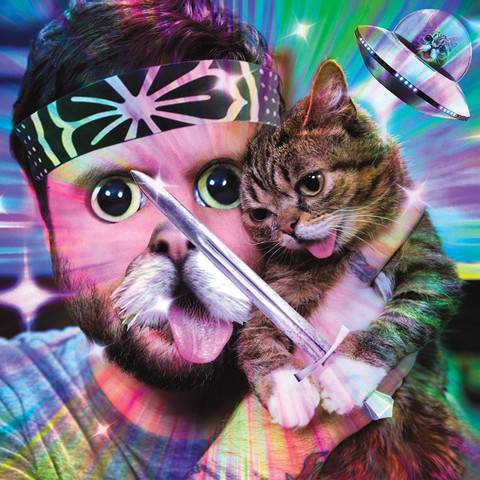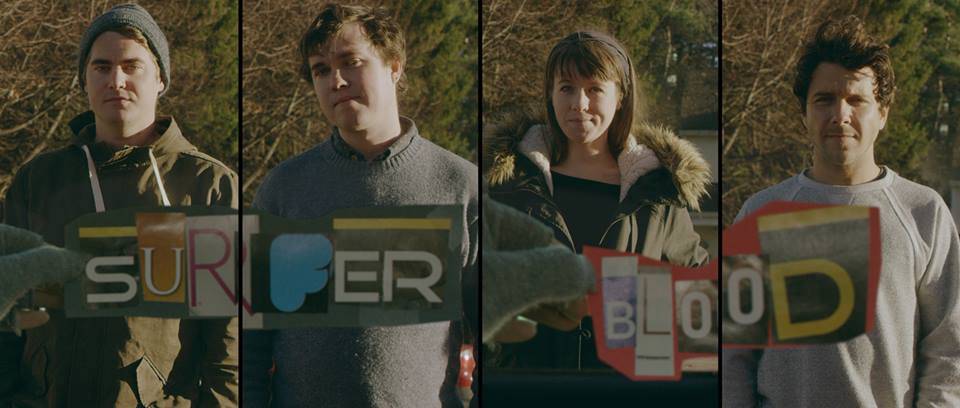When I speak with John Paul Pitts, front man for the band Surfer Blood, he seems cautiously, but authentically, optimistic. He’s polite and soft-spoken, and not completely with his guard down. Interviews don’t put him into robot mode; he isn’t jaded. He still has the legitimacy of an up-and-comer.
Indie band Surfer Blood has a youthfulness seldom rivaled. They manage to sound fresh and new in spite of being seven years old. They can keep this feel because they seem to always be in the process of reinventing their band’s identity. They do not do this entirely from want — it’s partially due to some crises they have been through over the years and the subsequent hurdles they’ve had to overcome. They are that much better because of it.
First up, there’s no denying that Surfer Blood sounds very beachy. They’ve kept that theme consistently by the use of actual sun and sand themes and by maintaining an attitude of calmness and exuberance at the same time. Sonically, the band is more aligned with the guitar-centric indie rock genre. The result is contemplative, lo-fi music underneath sunny, smiley strumming.
Surfer Blood originates from West Palm Beach, Florida, where several of the members went to high school together. They band coalesced during their first year of college, and their debut, Astro Coast, came out in 2009. Their sophomore effort, Pythons, was released in 2013, and their latest effort, 1000 Palms, has its one-year anniversary on May 12th.
SP: The band is from Florida, and you’re often classified as surf-rock. Do you think that label is fitting?
John Paul Pitts: Although but I never really saw it as surf rock myself, I don’t mind being called surf rock. I am really a fan of a lot of early surf rock stuff though. I love how guitar-driven it is. Also, there’s a lot of home-recording involved, especially with a lot of the tracks [and bands] from the 50s and 60s. I think that we do have a lot in common with surf rock, but I’ve always found us to be more closely aligned with an indie sound.
Surfer Blood has stuck decidedly to the “lo-fi” feel of much of indie music; it seems to be there area of strength as well as their comfort zone. Astro Coast was produced and recorded by the members on their own, and it was well-received by many critics. Astro Coast established Surfer’s Blood original sound as being the surf-indie breeziness of bands like Real Estate mixed with some Afrobeat pop hooks in the vein of Vampire Weekend, with a guitar-centered core referential of Pavement.
SP: There’s definitely a kind of DIY feeling to both the indie and surf rock genres.
Pitts: Yeah, exactly. So when people call it surf rock, I can see where they’re coming from that way.
———
Astro Coast turned Surfer Blood into a smash buzz band on the indie music scene. Suddenly they were catapulted towards stardom, touring nationally and even opening for the Pixies. They signed with the gigantic Warner Brothers Recordings and began work on their hotly anticipated sophomore LP, Pythons.
Unfortunately, some issues arose. In early 2012, John Paul Pitts was arrested during a domestic dispute with his then girlfriend. No charges were filed and the case was dismissed, but the event marred both Pitts’ reputation and the unfinished canvas of the band. Surfer Blood has struggled with establishing identity because they were still a fledgling band when issues arose. Pythons was produced amid the aftermath of this event, and the tension is audible in it. Pythons has a more produced sound and feel. Though not without its hooks, it’s a bit synthetic. Surfer Blood was getting used to the major label process of recording, and it’s clear that the boys were not feeling completely comfortable. Lyrically, Pythons also seemed to be showing Pitts working through some of the frustration he was feeling at the time.
———
SP: Your sophomore effort, Pythons, was Surfer Blood’s major label debut and thus sounds more polished than 1000 Palms. Do you have a preference between these two methods of production?
Pitts: I think there’s definitely a whole lot of middle ground between those two methods. I personally love recording, it’s one of my favorite things to do. So I really don’t mind how back-breaking it is to, you know, go in and get all the sound and do all the mixing and stuff like that.
SP: And be your own boss?
Pitts: Exactly — not having the pressure of being in a studio and having to fit in with a producer who’s twenty years older than you and has made some of your favorite records. You’re more likely to come up with something more creative or more out of left field that way, rather than when you’re in a situation when you’re probably just going to end up listening to someone else because they’re older and supposedly wiser about that kind of stuff. That being said, I’m very grateful for the ability to have recorded Python like we did. At least now we never have to wonder what it would have been like if had we made an album that way.
SP: A lot of the lyrics on 1000 Palms communicate hope and optimism, and the excitement of new beginnings, as opposed to some darker themes present in Pythons. How autobiographical are your lyrics?
Pitts: I mean, they’re about experiences that are tied to my life. I do think that there a lot that are more abstract, more based on dreaming, but you know, you’re tied to your lyrics whether you want to be or not. 1000 Palms was a record that I had to do a lot of soul searching for. We had gone from being community college students to seeing the world, and stuff like that. Seeing what more there is to life. I think that’s possibly why there’s so much frustration and dissatisfaction in Python’s music. Before 1000 Palms, we had moved to a new town, we had started new relationships, and sort of started fulfilling other aspects of life. I think I had been feeling cooped up for years, so taking time to focus on myself a bit was really healthy. Those are some of the reasons why I think the record sort of has like a lighter feel to it.
SP: Yeah, I think you guys were able to sort of fall back into a place where you felt more comfortable and maybe produce an album that sounded better in that way because of that, because you’re in a good place.
Pitts: Yeah, exactly. I mean I never would’ve admitted it at the time but making Pythons with a major label, and with all the music industry people sort of involved in the process, was a lot more pressure that I would’ve ever admitted when I was 24 years old. I mean, when you’re 24 you can do “anything,” but, you know. I think it was a lot of pressure for us.
———
Surfer Blood and the label big-wigs weren’t a perfect fit, and they ultimately parted ways. The band took some time off, and 2015’s 1000 Palms came from them resting and recollecting their thoughts. They went back to the roots of their debut album, and back to small labels and DIY recording processes. This is where they sound and feel the best, it seems – where they can be themselves. The video for “I Can’t Explain” pokes fun at the concept of authenticity.
Right around the release of 1000 Palms, the long time guitarist for Surfer Blood, Thomas Fekete, was diagnosed with a very rare and aggressive form of cancer, called a sarcoma. Again, Pitts and the band are steadfast in their optimism, to the point of demanding hilarity. On May 13th, they will release a split 7’’ recording with the Internet sensation cat, Lil Bub. Yes, Lil Bub.

SP: Tell me about the Lil Bub project, whose proceeds are going to help with Thomas’ care.
Pitts: Well it sort of fell into place, really. Often we play Indianapolis, where our record label is based, and we were able to meet Bub’s owner. He’s a music guy and a fan of the band and ya know, after the show, we were all hanging out with him and we were like, hey, this must be weird, but we have to meet Bub. And he was okay with that, so we were able to meet Lil Bub at a coffee shop and take all the pictures we want. And I guess Lil Bub has a band, of which she’s the singer for, so we kind of thought hey, let’s do this split 7’’ with this cat. And it actually went over really well, people were pretty into that idea. And it’s a really great thing because it all goes to help Thomas with his on-going medical care.
SP: That’s a really great project! I think it fits you guys’ personality just perfectly, and it’s an excellent cause.
Pitts: Thanks! He needs all the help we can give.
———
To look at it optimistically, Surfer Blood’s controversy has enabled them to stay flexible as a band. Pitts and his bandmates know that the controversy is not removable from their history, but they have still managed to push through. <span 0.875em;=”” line-height:=”” 1.357;”=””>With their personality often in question over the years, the fact that Surfer Blood fights cancer with an achingly adorable kitten says it all. The changes they have had to go through have made them skilled at landing on their feet. (Just like cats.) At the core, they are warm, genuine, and fun, and that is not something they need to change.
Surfer Blood is playing Thursday, May 12th, with Sound of Ceres and Euriah at The Accord. Doors open at 8:30 pm, with the show starting at 9 p.m. Tickets are $13 in advance/$15 at the door.








